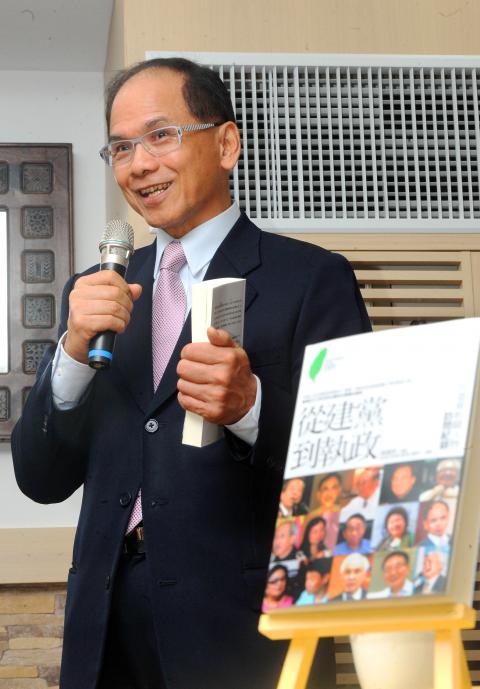|
‘Oral History’ about
DPP establishment launched
DIVERSITY: Containing interviews with important
figures from the founding of the DPP, it shows the range of views around the one
unifying goal of freedom and democracy
By Chris Wang / Staff reporter

Former premier, Yu Shyi-kun,
speaks at a book launch in Taipei yesterday.
Photo: Wang Min-wei, Taipei Times
The founding members of the Democratic
Progressive Party (DPP) have had different goals for both the future of the
party and Taiwan from the day the DPP was established — Sept. 28, 1986. This was
the reflection of several founding members in a book documenting the party’s
establishment and at a ceremony to launch the book yesterday.
The diversity of DPP members’ political ideology could be regarded as a natural
phenomenon, considering the political atmosphere of the dangwai (黨外, “outside
the party”) — period before the party was born, said Chen Yi-shen (陳儀深) Academia
Sinica research fellow and chief editor of Oral History of the DPP, in which 15
politicians and political advocates are interviewed about the party’s
establishment and early days.
“At the time, the DPP was the collection of a group of anti-Chinese Nationalist
Party [KMT] dissidents that included people with many ideologies, including both
Taiwan independence and unification. Their one similarity was their advocacy of
freedom and democracy,” Chen said.
Once the DPP resolved to support Taiwan independence, the unificationists left,
and the issue of the party’s China policy cam to the fore and remains hotly
debated within the party.
Former premier Frank Hsieh (謝長廷), who is known as a moderate on China policy,
said in his interview that the DPP should recognize the Republic of China (ROC)
and the ROC Constitution and use them as the foundation for fostering better
ties with Beijing.
Hsieh, who proposed the party’s name in 1986, was also quoted as saying that
adaptation was needed for a return to power and that if the DPP failed to win
the presidential election in 2016, the party could become completely
marginalized and “disappear.”
Ju Gao-jeng (朱高正), one of the 15 interviewees, was quoted in the book as saying
that promoting Taiwan independence had been “the biggest mistake” in the history
of the DPP. Ju, who was known for his physical confrontation with KMT
politicians when he served as DPP lawmaker, eventually left the party in 1990
and has engaged extensively with Beijing in recent years.
However, there were DPP founding members who stood on the opposite side of the
spectrum, including former premier Yu Shyi-kun (游錫堃).
Yu, who was also interviewed in the book, said on the sidelines of the book
launch yesterday that the DPP’s biggest problem was “the lack of the courage to
say out loud what it supported — be it Taiwan independence or normalization of
the country” and that this failing could alienate voters.
Meanwhile, Yu warned that the DPP “is looking in the wrong direction” in terms
of its future, arguing that winning majority in the Legislative Yuan would be
more important than winning the presidential election.
Citing the DPP’s time in power, Yu said the legislature was the final
decisionmaker of national policy, adding that the effort to cultivate grassroots
organizations would help the party in the presidential election.
Former DPP lawmaker Lin Cho-shui (林濁水), a founding member known for his advocacy
and exposition of Taiwan independence, observed that the basic structure for
cross-strait relations in the next 20 years have been set, with the DPP and the
KMT enjoying advantages in different aspects.
“The DPP would be trusted to protect Taiwan’s sovereignty and distribute wealth
fairly while most people believe the KMT is better at maintaining cross-strait
stability and economic exchanges. That won’t change in the next 20 years,” Lin
said.
|
![]()
![]()
![]()